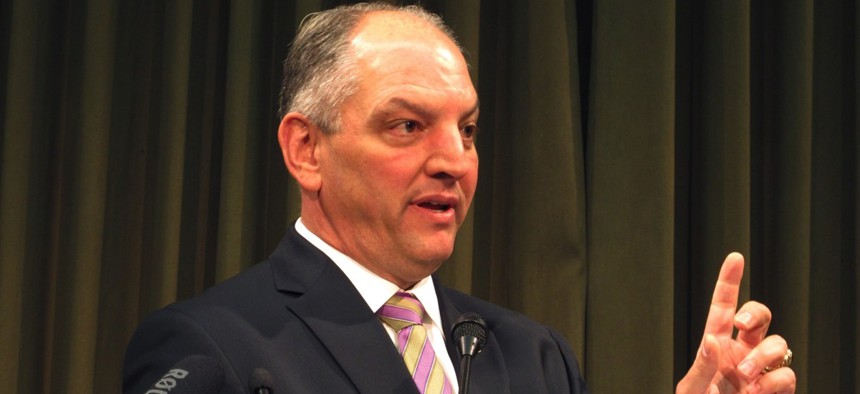Louisiana Governor Touts Medicaid Expansion as Way to Help Cure Budget Woes

Louisiana Gov. John Bel Edwards Melinda Deslatte / AP Photo

Connecting state and local government leaders
“It’s the easiest big decision I will ever make as governor,” John Bel Edwards said of his move earlier this year to expand the health care program for those with low incomes.
With enrollment under Louisiana’s pending Medicaid expansion set to begin in about a month, Gov. John Bel Edwards visited a clinic in Baton Rouge Monday, where he continued to highlight the benefits he believes the state will see by opening up the healthcare program to more people.
Edwards signed an executive order on his second day in office to expand Medicaid under the federal Affordable Care Act. The governor contends that the expansion will not only provide a pathway for working people with lower incomes to get access to healthcare but that it will also help alleviate some of the pressure on Louisiana’s shortfall-afflicted budget.
“In the first year alone the state of Louisiana is gonna save more than $180 million simply because we took our federal tax dollars from Washington, brought them back to Louisiana, instead of letting the federal government send those dollars to 30 other states who have already expanded their Medicaid programs,” the governor said Monday.
“It’s the easiest big decision I will ever make as governor,” Edwards, a Democrat who is about 112 days into his first term, noted earlier, referring to the expansion.
Edwards’ administration said in mid-April the Medicaid expansion will save Louisiana about $677 million during its first five years. But at least two hospitals have questioned whether the administration’s savings estimates could be too optimistic.
During a special session that ended in early March, lawmakers in Louisiana scrambled to remedy about $900 million in shortfalls during the current budget cycle.
A top budget official in Edwards administration told lawmakers in late April that in the upcoming fiscal year, which begins July 1, the state’s deficit will be just $600 million, rather than $750 million, largely because of savings from the Medicaid expansion.
Enrollment is set to begin for the expanded program on June 1, with benefits scheduled to go into effect July 1.
State officials anticipate that somewhere around 375,000 additional residents could join Louisiana’s Medicaid rolls under the expansion, which involves broadening eligibility requirements to include people earning up to 138 percent of the federal poverty level.
This year, that amount of annual income for a family of four is $33,534.
Edwards has emphasized that about 70 percent of the people who will get healthcare coverage through the Medicaid expansion are full-time employees.
Under Affordable Care Act guidelines, the federal government will pay 100 percent of the expansion costs through 2016. That percentage will then decline gradually until it hits 90 percent in 2020 and the years thereafter. Skeptics of the state expansions have argued that, as the federal cost-sharing payments decline, states will be left with unwieldy financial burdens.
Among the more vocal opponents of the plan to expand Medicaid in Louisiana is the state’s chapter of the National Federation of Independent Business. The group has urged legislators to take steps to block the expansion, saying it would hurt employers.
Rep. Jay Morris, a Republican who hails from northern Louisiana, introduced a bill that would require approval of expanded Medicaid eligibility standards by the Legislature's committees on health and welfare and the Joint Legislative Committee on the Budget. But members of the House Health and Welfare Committee voted 10-0 on April 7 to defer the legislation.
Louisiana joins 30 other states, along with Washington, D.C., that have moved to expand Medicaid eligibility under the Affordable Care Act.
Speaking about the expansion to people gathered at the clinic in Baton Rouge Monday, Edwards said: “It isn’t about putting a card in your wallet, it’s about producing better health outcomes.”
Bill Lucia is a Reporter at Government Executive's Route Fifty.

NEXT STORY: States Struggle to Provide Housing for Migrant Farmworkers





